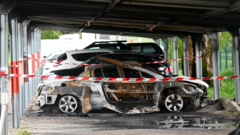Following a wave of attacks on French jails, authorities lean toward the conclusion that drug gangs are behind the violence, responding to the government's stern crackdowns. Interior Minister Bruno Retailleau insists the confrontation is a direct result of the government's new law on drug trafficking aimed at diminishing their operations.
Unprecedented Assaults on French Prisons Linked to Drug Gangs

Unprecedented Assaults on French Prisons Linked to Drug Gangs
A series of arson and gun attacks in France prisons raises concerns over drug gang retaliation against government anti-trafficking laws.
In recent days, French prisons have come under a wave of violence, with reports detailing coordinated assaults that have included car fires and gunfire. The surge began late Sunday night, leading to a tally of twelve separate incidents. While police have stated that they are keeping all options open concerning the investigation's direction, a prevailing theory is that recent violence is being orchestrated by drug gangs retaliating against governmental crackdowns.
French Interior Minister Bruno Retailleau voiced his belief on Thursday that these attacks were initiated by "drugs-yobs," specifically indicating that the severity of the government's anti-drug trafficking measures has pushed them to react defensively. "It’s not they who have declared war on us. It’s we who declared war on them,” he stated, underscoring the government's intent to disrupt their revenue sources.
The series of events has not only involved setting fire to vehicles outside various prisons but also directing gunfire towards law enforcement targets. Graffiti featuring the acronym DDPF, which stands for “Droits des Prisonniers Français” (Rights for French Prison Inmates), has emerged at multiple crime scenes. Despite being a newly coined symbol, the group behind the graffiti feels emboldened enough to post a video reportedly showing the burning of a prison officer's car on Telegram.
This unexpected narrative of drug gangs presenting themselves as defenders of prisoners’ rights deviates from the norm. Investigations suggest that those involved in the violence resemble members of drug gangs rather than traditional far-left militants, highlighted by their social backgrounds and lack of coherent political messaging compared to established radical groups.
While some speculate that foreign actors might be influencing these events, the prevailing sentiment among investigators and officials leans towards the involvement of domestic drug factions. Recent actions from the French government denote a two-pronged approach to combat the drug epidemic, as the interior and justice ministers are actively promoting legislation aimed at stifling the power of drug lords.
Upcoming measures include a special prosecutors' office dedicated to drug-related offenses, as well as the establishment of high-security prisons designed to contain the 100 most notorious drug offenders. These facilities will implement stricter visitation protocols aimed at preventing inmates from continuing their operations undetected from within prison walls.
The assaults on prisons, according to government assessments, signal a rare moment of intimidation felt by the drug gangs – a situation that could galvanize both political support and public trust in an administration committed to making substantial changes to combat drug-related crime. Completing the narrative, the success or failure of capturing those responsible for these assaults will certainly influence public perception of the government's resolve in this ongoing battle.






















